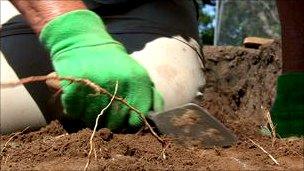Jersey is described as "Ice Age time capsule"
- Published

Jersey has been described as an "Ice Age time capsule" by a team of archaeologists exploring a potential Ice Age camp.
In 2010 a team from four universities made Neanderthal finds at a site in St Brelade.
The team, led by archaeologist Matt Pope, is returning to explore a 14,000-year-old site in St Saviour.
The team will also be using sonar to map ancient landscapes beneath the seas off Jersey's coast.
Internationally important
The team found sediment dating back to the ice age in St Brelade during the visit in 2010 and examined Neanderthal tools left there.
Andrew Shaw, from Southampton University, said Jersey was like an "ice age time capsule", preserving internationally important archaeology.
He said that data found should show Jersey's dramatic ancient heritage to future generations.
Mr Pope said the island's Neanderthal history was of international significance.
He said: "It's really easy to get excited about early archaeology in Jersey.
"For such a small land mass it has an incredibly rich record of ice age archaeology covering about 250,000 years of human pre-history.
"Islands are incredible magnets for people in the ice age."
Mr Pope said archaeologists were just beginning to discover the importance of Jersey's ice age history.
He said: "What you have is a number of sites just remaining undiscovered.
"They are deeply buried under sands and rubble that is banked up against lost beaches, parts of the ancient seabed preserved under St Helier and St Saviour.
"We are only starting to appreciate now how rich that record could be."
- Published12 October 2010
- Published20 May 2010
- Published5 April 2010
- Published26 January 2007
- Published15 March 2006